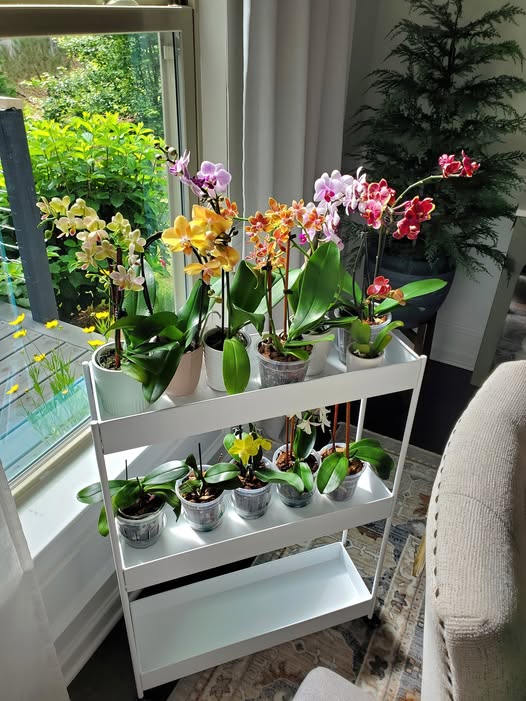Want to bring a new orchid to your home, but worried if it’s pet-safe or not?
The short answer is that orchids are not toxic to your cats or dogs. But it does not mean that you let them nibble on your plants.
Personally, my cat doesn’t seem interested in orchids and leaves them alone. Maybe that’s why I’ve grown them easily.
But if your dog or cat loves to chew on plants, learn about how orchids interact with them. I’ll cover the potential risks, pet-safe care tips, and what to do if your pet takes a bite of your orchid.
Let’s get started!
Table of Contents
General Safety of Orchids for Pets
It’s quite tricky to be a plant and pet parent simultaneously. Fortunately, orchids are not toxic to pets. However, your cat or dog may inadvertently destroy some leaves. The Orchidaceae family comprises over 25,000 species, and while most of them are listed as non-toxic, rare or untested hybrids should be approached with caution, as their potential risks may not have been reported yet.
Phalaenopsis orchids (moth orchids, moon orchids), Dendrobiums, Odontoglossum, Oncidium, Masdevallia, Reed Stem Epidendrum, Cattleya, Vandas, Encyclia Tempensis, and Jewel orchid are listed as non-toxic to cats and dogs by the ASPCA.
Some orchids, like lady’s slipper orchids (Cypripedium spp.), may cause mild skin irritation, but do not contain any lethal component in any part of the plant body.


Potential Risks of Orchids for Pets
Although orchids are non-toxic for pets, it doesn’t mean it’s okay for pets to eat them. It’s not safe to leave them alone with the pets, especially if your pets have a habit of chewing plants. Pet parents often report symptoms of plant poisoning in pets. The potential risks are summarized below:
Gastrointestinal Disorders (GI)
Chewing or ingesting a few leaves may not have any adverse effects. However, munching significant amounts of orchid plants can cause mild discomfort, upset stomach, vomiting, diarrhea, or bowel obstruction in severe cases.
Carnivores are unable to digest plant material properly, so two to three episodes of vomiting or diarrhea are typically not a serious concern.
Allergic Reactions
Although it is rare, some pets may be allergic to plants and fragrances. Signs of allergic reactions include dermatitis and respiratory issues.
Chemical Residue or Growing Medium
Moreover, even if the plant does not contain any lethal substance, the chemical residue of fertilizers and growing mediums poses significant threats to the pets. If your pet eats soil contaminated with fertilizer or leaves sprayed with pesticides, consult a veterinarian immediately. Additionally, there is a risk of choking and intestinal blockage if a pet consumes excessive amounts of orchid bark or potting mix.
Why Do Pets Eat Orchids?
- Cats: Eating a houseplant is a common behavior observed in domestic cats. Cats are curious creatures that often chew things around them. Therefore, plants are not an exception either. They might nibble on petals or leaves for multiple reasons, such as boredom, due to the plant’s texture, or its scent.
- Dogs: Dogs are naturally attracted to things that are visually appealing or have a pleasant scent, whether they are houseplants or random items around them. They sometimes have an instinctual urge to eat plants, especially if they frequently eat grass. A dog with a gastrointestinal disorder often has a persistent desire to eat grass or plant leaves, which it then vomits up in an attempt to feel better.
Additionally, dogs may have a disorder called “pica,” which leads them to eat non-food items. So, whenever you observe regular chewing of houseplant leaves in pets, have them checked by a vet to identify the underlying issues.
- Stress and Anxiety: Pets may chew on plants as a form of stress relief. Initially, they approach the plants intending to play with them, but they may randomly develop an urge to bite a few leaves.
How to Prevent Pets from Eating Orchids
Pets, especially cats, are sneaky creatures that always find a way to get to houseplants even when you think they can’t. To keep your orchids safe from pets and pets from your orchids, I recommend keeping your plants out of their reach. Now, I know it’s difficult, but below are a few tips that work for me, sometimes.
1. Keep Orchids Out of Reach
I use high shelves at a noticeable distance for all houseplants. Furthermore, try to keep the plants in hanging planters and in enclosed plant stands.
You can create a pet-free zone using baby gates or pet barriers around the plants.
Another great way to keep the pets away from the orchids is to use a dedicated plant room. You can create a separate plant room in the house or a greenhouse outdoors, where pets aren’t allowed. It is a wonderful way to keep both plants and pets safe.
But worry not if you have a compact space. My friend invested in Greenhouse cabinets, she says that they are lifesavers. Not only do they keep plants away from pets, but they also protect against pest infestations. IKEA-style glass cabinets work well for all indoor houseplants while keeping pets out.


2. Provide Safe Alternatives
Pets get bored easily. They need constant stimulation and attention, so it’s better to divert their attention. Offer them chew toys, cat grass, or puzzle feeders to get them busy. If the pets have a habit of chewing random things, chew toys are a great way to fulfill their chewing instinct.
Dogs often like squeaky toys. The noise keeps them entertained, and they engage with it. Interactive toys for cats, such as toy mice and cat food puzzle toys, are best to keep them mentally stimulated and self-entertained. Moreover, providing them with a scratching area, playing with them, and taking them out for a walk will help minimize the plant’s curiosity.
There are a variety of options available, but ensure the toys are eco-friendly and durable for the safety of pets.
3. Use Natural Deterrents
It’s best to make your natural repellent using Citrus peels (such as lemon, orange, or grapefruit) because pets dislike the smell and may stay away from the orchids. Mix orange and lemon peel in one liter of water and spray a small amount of it around the pots.
Another DIY option is to mix 1 part apple cider vinegar with two parts water in a spray bottle. A light mist around the shelves will discourage the pets from chewing and bothering your orchids.
Some people use chilly water, but I am not quite fond of this method, so I won’t recommend it.
What to Do If Your Pet Eats an Orchid?
Chewing a few leaves is not a problem unless you think pets are chewing a large number of leaves. Therefore, ensure your cat or dog does not come into contact with the orchids.
Monitor for Symptoms
Keep a close eye on the pet’s behavior if they have chewed the plant. If symptoms are mild, like 2 to 3 episodes of vomiting and mild discomfort, then no treatment is required. Give your pet fresh water and avoid further exposure.
Take them to the vet immediately if symptoms are severe, such as:
- Unusual behavior of pets
- Lethargic or lazy
- Loss of appetite and dehydration
- Excessive drooling
- Persistent diarrhea and vomiting with expelled plant material
Treatment involves anti-nausea medication or fluids. Severe conditions like bowel obstruction may require surgery only if your pet has significantly munched on the bark and foliage.
Check for Signs of Excessive Chewing.
If you are not sure about the symptoms, check the orchids, damaged leaves, missing flowers, and irregular bite marks that indicate a pet has eaten the plant.
FAQs
Which Orchid is Toxic to Pets?
ASPCA has listed orchids as nontoxic for cats and dogs. However, it is essential to note that orchids comprise more than 25,000 species, and some rare hybrid varieties may pose a threat to pet life. Generally, the common non-toxic orchids are Phalaenopsis, Dendrobium, Odontoglossum, Oncidium, Masdevallia, Reed Stem Epidendrum, Cattleya, Encyclia Tempensis, and Jewel orchid.
Are Orchid Leaves Poisonous?
No, orchid leaves are not poisonous. But it does not mean that pets are allowed to chew them. Significant consumption of plant leaves or petals may cause stomach issues along with discomfort.
How do I Get My Cat to Stop Eating my Orchid?
Cats are curious creatures, but it’s easy to divert their attention. Your cat is likely to eat orchids because of boredom or because the plant’s texture is visually appealing to them. The best way to stop the cat from eating the orchid is to provide it with alternative materials, such as toys and puzzles. However, if the cat specifically likes plants, offering the cat grass can help in this matter.
Is Orchid Fertilizer Toxic to Dogs?
Yes, orchid fertilizer is toxic to dogs, according to the Pet Poison Helpline. All types of chemical residue can cause an upset stomach and vomiting, so keep your plant away from pets to avoid any mishaps. If you suspect your dog has ingested growing medium with fertilizer, contact a veterinarian immediately.
Summing Up
Being a houseplant lover and pet parent is quite risky, but keeping an orchid with a pet is manageable. Just make sure your curious pets don’t ingest it. Always monitor them and don’t let them destroy your orchids. I know just saying is easy, but you have to find your way around.
Divert your pet’s attention to other toys and materials, and spend quality time with them so that they won’t be tempted to chew on the plants. Lastly, keep toxic plants out of your home and choose pet-safe alternatives.
Did I miss anything? Let me know in the comments below!

